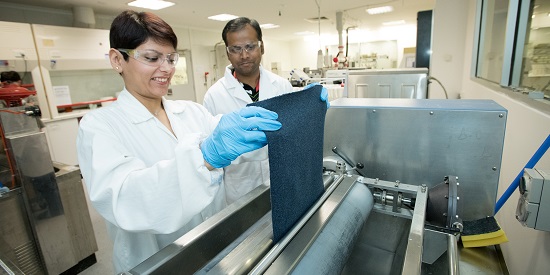No Fuzz: New Deakin treatment does away with fabric pilling
Media release
That nasty pilling on your woollen jumpers and bedsheets could soon be a thing of the past, thanks to a new textile treatment developed by textile innovators at HeiQ with help from researchers from Deakin University's Institute for Frontier Materials (IFM).
Working collaboratively under the framework of the ARC Research Hub for Future Fibres the partners have developed a range of "No Fuzz" treatments that reduce unsightly pilling and make garments look and feel newer for longer.
IFM Senior Research Fellow Dr Alessandra Sutti said pilling was caused by friction, as loose fibres in the material rub together and become tangled, forming annoying fuzzy balls.
"The key to avoiding pilling is to either remove fluffy fibres or to stabilise the fabric structure so fibres can't easily loosen and tangle," Dr Sutti said.
"HeiQ's NoFuzz technology bridges the gaps and strengthens loose fibres with adhesive polymer structures, reinforcing fabric yarns and resulting in a significant improvement against pilling."
HeiQ Australia chief executive Dr Murray Height, co-founder of HeiQ Materials AG, said pilling and abrasion resistance in general was one of the biggest problems affecting clothing, especially when it came to staple fibre textiles such as wool and natural/synthetic blends.
"The need for an off-the-shelf treatment that can be applied to any fabric without noticeable impact on its feel or appearance has been discussed since the early days of the IFM/HeiQ partnership," Dr Height said.
"The textiles industry has tried to deal with this issue for years, but none of the current methods are entirely satisfactory – most fabric-based treatments result in an unpleasant feel to the fabric and reduced comfort."
Dr Sutti said the HeiQ NoFuzz treatment helped to make clothing more robust to wear and tear, thereby playing a role in extending the useful lifetime of garments.
"This treatment can be used on all fibre types, but it has been shown to be particularly effective on spun yarns and natural/synthetic blends, and we're using materials that reinforce component yarns within the main fabric structure," she said.
No Fuzz is the second commercial product to come out of IFM's collaboration with HeiQ, following the 2016 release of the HeiQ Real Silk textile treatment.
Dr Sutti said she and her team were committed to working with HeiQ on a range of projects to improve the performance and sustainability of textiles.
"Our collaboration covers a wide range of topics, from the development of the short polymer fibre platform all the way through to the implementation of new technologies in textile treatments," she said.
This research was supported by the ARC Research Hub for Future Fibres.

